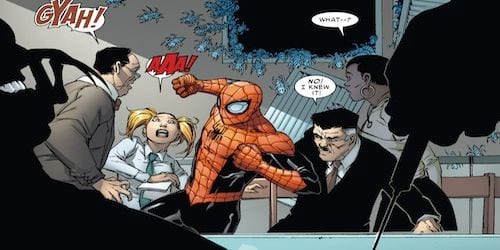
If we haven’t figured it out by now, Superior Spider-Man is an examination of what it actually means to be a hero, to do the unthinkable, for the unlikely and then go about your life. Fight the villain, save the day, earn a doctorate, all the while trying to stay on the good side of morality. Otto believes he can do all that, be a better Spider-Man and Peter Parker than the actual Peter was able to be during his life. And with no one catching on that there was a switch. It’s an interesting examination, especially in light of our times, where we are constantly deconstructing superheroes and the morality involved with having great power. Superior Spider-Man #11 gives us a moment to reflect on a specific aspect of superheroics and morality. Can villains reform? And while I pondered this question and thought about Otto taking over Peter’s life, another question came to mind: has Dan Slott ever watched Fringe?
This entire issue of Superior Spider-Man is framed in dialogue between Spider-Ock and Smythe, where Ock refuses to accept the idea of villains being capable of reforming themselves. It’s the reason he murdered Massacre and one of the reasons he’s witnessing Smythe’s execution. The hypocrisy is evident as we look at the path Otto has taken since taking over Peter’s body. There are certainly questions about whether he’s being forced to by whatever is left of Peter’s conscious, but for all intents and purposes, Otto is a reformed villain acting as a hero, his level of arrogance notwithstanding.
Writers Dan Slott and Christos Gage focus on Otto’s arrogance in the early pages of this issue, as his frustrations continue to mount over the limitations of Peter’s life. Be sure that this will be Otto’s ultimate undoing at some point. It was Peter’s undoing as well to an extent.
Getting back to Otto’s hypocrisy, I’ve been critical of Superior Spider-Man for not making the killing of Massacre more prominent. It takes a good deal of suspension of disbelief that there hasn’t been more fallout from that moment up to this point. I’ll give credit to Slott that the point is always in the spaces between the pages of the title, not exactly addressed – accept for a minor scene in a previous installment – but not completely dismissed. But the theme (or question) about whether villains can reform keeps resurfacing. Otto, in spite of his current circumstances, doesn’t believe in it. That gives us a possible hint as to the direction of Superior Spider-Man in the months to come.
What’s also to come? More people figuring out that Peter is not Peter and Spider-Man is not Spider-Man. This is why I wonder if Dan Slott has ever watched Fringe. The late TV show’s third season dealt a lot with people not being who they claim to be, particularly when lead character Olivia Dunham was replaced by her alternate universe doppelgänger.
If you’ve never watched Fringe, here’s the breakdown. Part procedural, part serial, Fringe dealt with members of a special FBI team investigating strange phenomenon and their dealings with the possible collision of two parallel universes. At one point Olivia, an agent with the FBI, is replaced by her alternate universe counterpart (Fauxlivia) and no one from Olivia’s universe is the wiser.
Both series deal with characters pulling a ruse, and one point Fringe makes, for the benefit of its own narrative, is that when people deal with this possibility they often ignore the obvious because of the their emotions for the replaced person. This point came to mind when thinking about Superior Spider-Man #11’s major supporting character, J. Johan Jameson. He and Spider-Ock have grown close. He hated Spider-Man for so long, but now they’re nearly best pals. A shift in one person’s attitude in stories like this one tends to make that happen. If Jameson wasn’t as arrogant as Otto himself, perhaps he’d be more suspicious that something is not right. But would he even care?
We’ve already seen suspicions mounting from Carlie and Mary Jane – Carlie was point blank told what was up by dying Peter-in-Ock’s-body. We should expect to see more of this. And we should probably expect to see Aunt May, in the face of certain evidence, dismiss that this Peter is not her Peter. He’s getting his life together, and the emotion attached to Peter being successful should drop a veil over Otto’s questionable behavior. It is a perfectly valid narrative direction, as Fringe demonstrated early in its third season. To let it go would seem a waste and bring into question just what makes the people we love, the people we love.
It’s the big questions that drive Superior Spider-Man. Issue to issue it’s entertaining, but as a whole it’s far more interesting than its parts. Issue #11 is a good example, as the themes and the questions about those themes are the most interesting part about it. If it can maintain massaging the big questions, the rest will fall into place.

![Call for Papers: All Things Reconsidered [MUSIC] May-August 2024](https://www.popmatters.com/wp-content/uploads/2024/04/all-things-reconsidered-call-music-may-2024-720x380.jpg)



